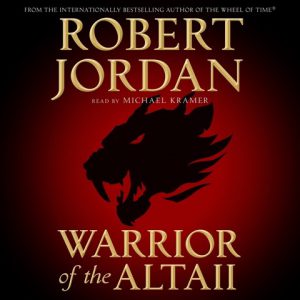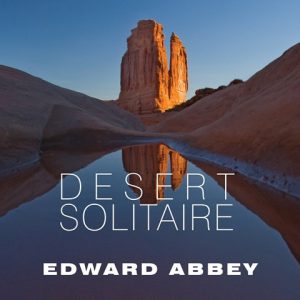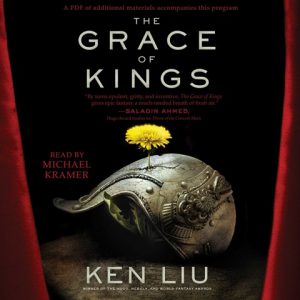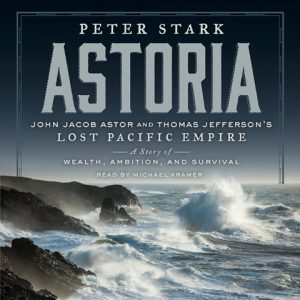
Most of you will associate today’s Take 5 guest narrator with audiobooks set in imaginary worlds. To me, Michael Kramer’s name is especially linked to Robert Jordan’s Wheel of Time series; in fact, he’s narrated all of the books in that very popular series in collaboration with Kate Reading. Tens of thousands of fantasy fans have welcomed Michael into their lives via speakers, headphones, and earbuds as they listened to 14 audiobooks and well more than 400 hours of action, adventure, war, and politics set in an ancient world.
If you’re a fantasy fan, you may be surprised to learn that Michael is equally skilled at performing history, memoir, literary fiction, thrillers, children’s stories, science fiction, and more. The audiobooks I’m recommending today do indeed include fantasy—such as an exciting new production of a recently released Robert Jordan book—but I also feature a modern classic, a thriller, and history. I encourage you to get to know Michael’s work on stories set in the real world as well as fantastic ones.
5 Audiobooks
 Attention fantasy fans: There’s a new audiobook set in the Wheel of Time universe: WARRIOR OF THE ALTAII by Robert Jordan, which was written decades ago but is set in the same world. This story takes place in an earlier time than the main series and features a larger-than-life hero who is determined to save his people. Michael infuses his performance with his deep knowledge of the author’s style and uses his excellent sense of pacing to guide listeners through relaxed conversations and then into the chaos of battle.
Attention fantasy fans: There’s a new audiobook set in the Wheel of Time universe: WARRIOR OF THE ALTAII by Robert Jordan, which was written decades ago but is set in the same world. This story takes place in an earlier time than the main series and features a larger-than-life hero who is determined to save his people. Michael infuses his performance with his deep knowledge of the author’s style and uses his excellent sense of pacing to guide listeners through relaxed conversations and then into the chaos of battle.
 Edward Abbey’s DESERT SOLITAIRE: A Season in the Wilderness is a modern classic. Published in the late 1960s, the essays in this collection recount Abbey’s experiences and observations over the three years he worked as a park ranger in southern Utah, including stories of people and nature as well a call for environmental protection. Michael’s intimate and heart-felt delivery erases the wall between listener and author, helping us see the world through Abbey’s perspective.
Edward Abbey’s DESERT SOLITAIRE: A Season in the Wilderness is a modern classic. Published in the late 1960s, the essays in this collection recount Abbey’s experiences and observations over the three years he worked as a park ranger in southern Utah, including stories of people and nature as well a call for environmental protection. Michael’s intimate and heart-felt delivery erases the wall between listener and author, helping us see the world through Abbey’s perspective.
 Once you finish listening to the Wheel of Time books, consider queuing up THE GRACE OF KINGS, the first book in the Dandelion Dynasty series by Ken Liu. This epic fantasy is infused with Chinese myth and history and focuses on two friends who helped bring down an emperor. Although once united, the men have different visions for the future and now find themselves on opposing sides. Michael handles the complex plot, non-English words, and large cast of characters with aplomb, keeping listeners fully invested in the action.
Once you finish listening to the Wheel of Time books, consider queuing up THE GRACE OF KINGS, the first book in the Dandelion Dynasty series by Ken Liu. This epic fantasy is infused with Chinese myth and history and focuses on two friends who helped bring down an emperor. Although once united, the men have different visions for the future and now find themselves on opposing sides. Michael handles the complex plot, non-English words, and large cast of characters with aplomb, keeping listeners fully invested in the action.
 Peter Stark’s ASTORIA has a long subtitle that should pique the interest of any history buff: John Jacob Astor and Thomas Jefferson’s Lost Pacific Empire: A Story of Wealth, Ambition, and Survival. Following the success of the Lewis and Clark expedition, Astor and Jefferson envisioned an American settlement at the mouth of the Columbia River and thus sent two parties westward: one by sea and one by land. Michael’s performance highlights the settlers’ initial optimism as well as their downward spiral into fear and uncertainty as they faced the trials of their journeys. Although Astoria didn’t thrive, the experiment helped spur on westward expansion.
Peter Stark’s ASTORIA has a long subtitle that should pique the interest of any history buff: John Jacob Astor and Thomas Jefferson’s Lost Pacific Empire: A Story of Wealth, Ambition, and Survival. Following the success of the Lewis and Clark expedition, Astor and Jefferson envisioned an American settlement at the mouth of the Columbia River and thus sent two parties westward: one by sea and one by land. Michael’s performance highlights the settlers’ initial optimism as well as their downward spiral into fear and uncertainty as they faced the trials of their journeys. Although Astoria didn’t thrive, the experiment helped spur on westward expansion.
 Debut mystery writer David Lyons dishes up some New Orleans spice in ICE FIRE, starring a newly appointed U.S. district judge who brings his Cajun culture to the bench. The case involves murder and dirty dealings in the energy world and takes our hero out of NOLA to Boston and Washington. Michael handles the variety of American accents while amping up the suspense and smoothly delivering the plot twists. Stock up on beignets and get ready to meet a new crime solver.
Debut mystery writer David Lyons dishes up some New Orleans spice in ICE FIRE, starring a newly appointed U.S. district judge who brings his Cajun culture to the bench. The case involves murder and dirty dealings in the energy world and takes our hero out of NOLA to Boston and Washington. Michael handles the variety of American accents while amping up the suspense and smoothly delivering the plot twists. Stock up on beignets and get ready to meet a new crime solver.
5 Questions
Michael Kramer’s talents serve him well across the genres, and I hope you’ve added to your audiobook wish list. Before you go off to start listening to your next book, take a moment to get to know the man who has brought one your favorite universes alive. Michael was kind enough to answer a few questions about his life as a voice performer and beyond.
AudioFile: What is the one thing you wish you knew before you recorded your first audiobook?
Michael Kramer: Don’t forget to tell the story! As a beginning narrator, you can get so caught up in thinking about technique, correct pronunciation, breath control, etc. that you forget to tell the story. All those things are important, but they are subservient to the story. It’s a bit like a musician who plays every note correctly but that isn’t making music. It’s your job to find the music, the story, that the author has created in the notes, the words, and their relationship to each other and the listener.
And don’t be afraid to make a mistake! You will crash and burn all the time. Narrating is all about breathing. The eye and mind don’t need to breathe, but the voice does; this seeming handicap is actually an incredibly expressive tool. Breath frames the thought, maintains or releases tension, but the eye just sees the next word. Ha, take that, Eye! The clues in a text as to how to employ breath, however, are often very subtle and discovered only in the moment of interpretation, belatedly—oops! Crash and burn! And that’s fine! Who knew you needed to breathe here to keep this thought together, or if you breathe there, you release all the tension in the scene? Yes, some will recognize the clues sooner, or more readily, but that is a skill in the craft that you will always be honing. Relax, take the insight from the crash, and then, tell the story.
AF: What are you doing when you’re not working?
MK: These days I am playing basketball, practicing yoga (so I can play basketball), gardening (got to have my hands in the dirt every so often), reading (both fiction and nonfiction), following baseball and fantasy baseball, and paying attention to U.S. politics and world affairs.
I’ve always been involved with athletics, as hard as that is to do when involved with theatre, but whether just running and working out or something more organized, it’s very important to me—and my health. About 10 years ago, I got into a regular pick-up game of basketball, which led to playing with an over-30 men’s league. It’s great to have a more communal activity, given that narration is so solitary. I started practicing yoga to try to enhance my flexibility and strength on the court. I have only recently begun to understand the conceptual and emotional sides of practicing.
Growing up in rural Minnesota, we grew most of our food—one year we harvested over 1,200 pounds of potatoes. There is something very satisfying and grounding (no pun intended) about eating something that you harvested from your own garden. Generally more flavorful too.
I love to read, always have. Love stories, love finding out about things, love entering into dialogues with authors through books. I was always very inquisitive, and in a world without internet; only four channels of television; and phones with rotary dials, cords, and connected to the wall, reading was my way of exploring it.
Baseball has always been in my life. My dad played—he was really good, hitting .400-something with power for a state championship team—and when I was growing up the game was always on the radio. I have many memories of sitting in my grandparents’ kitchen playing bridge with game on in the background.
Living in the Washington, DC, area, especially since the 2016 election, it has become really important to me to pay attention to what is happening in the world.
AF: What are some of the particular challenges of narrating nonfiction?
MK: The single most challenging aspect of narrating nonfiction is to remember that it is still a story, fact-based as it may be. I had the privilege of hearing David McCullough speak at the Library of Congress Literacy Awards a few years ago. He talked about coming to Washington, DC after Kennedy’s election, as a young man and working as a congressional staffer. As I recall, he said he was tasked with doing some research at the Library of Congress about the Johnstown Flood, and as he gathered various photographs, accounts, and histories of the event, he found himself thinking, Why are the histories so boring? This is exciting stuff. Why don’t they write about like it’s a play (he came from New York City with a theatrical background)? And I believe he said that someone challenged him: Well, why don’t you? So he did, and the rest is, well, history. Point being, that he is an author well aware that he is telling a story, and if you’ve ever read anything by David McCullough (and if you haven’t, please do, he is so good!), it reads like a thriller. Not every nonfiction writer is so concerned with the form of the content they are relating, but your job as a narrator is to . . . tell the story.
AF: What’s your most embarrassing moment in the recording booth?
MK: At the Library of Congress Talking Books studio I was narrating a story by Rick Bass, I believe it was “Where the Sea Used to Be,” very poetic as Rick Bass’s work is. It was set in the American West, I think Montana, and there were some Basque shepherds calling out, “Andale! Andale!” as the main—English-speaking—character was approaching. So I yelled “ANN DAIL, ANN DAIL,” thinking Andale was some breed of sheep and not sure why the Basque shepherds were so intent on informing the main character as to the sheep’s breed, but whatever. Of course, andale is Spanish, pronounced “AHN dah lay” meaning “Let’s go”—the shepherds obviously were driving the sheep—but not obvious to me. Now to be fair, as I recall, the whole section was in italics and there was no accent on the first “a.” Fortunately, it was caught in corrections; but still to this day at the studio when there is a really silly mispronunciation, I will hear a chorus of “ANN DAIL, ANN DAIL!”
AF: What are the pros and cons of recording a series?
MK: The pros are that you’re familiar with the author’s syntax and rhythm and style, so you have a better idea of how to narrate the later books in the series. You have already distilled the characters’ voices and are familiar with the placements. The cons are that it can be several years since the last book of the series or a character who has not appeared since book 1 shows up in book 4, and, What is that character’s voice? Good authors, like a Robert Jordan, a Brandon Sanderson, or a Donald E. Westlake, tend to provide at least a thumbnail or shorthand description in the new book, either to remind a listener of who the character is or to introduce the character to someone who hasn’t started at the beginning of the series. The challenge for both the author and narrator is to get this across in such a way as to not bore the returning listener while making sure the new listener gets all the background.
Also with a lot of sci-fi and fantasy, you have newly minted names and terms, which exist only in this book’s world, so remembering how they are pronounced is challenging—especially before computers (yes there was a time . . . ).
Thanks so much, Michael, for taking the time to talk with us. I too find something very satisfying about gardening, whether growing vegetables or watching a flower go from seed to bloom. I couldn’t agree more that David McCullough knows how to tell a story; he’s one of my favorites, too. I wonder if he has had any ANN DAIL moments.
To discover more audiobooks performed by Michael Kramer, explore his audiography.






